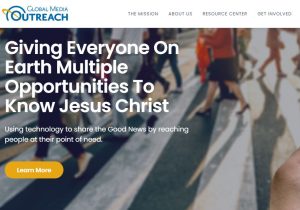More Ministries Use Social Media and Web for Digital Evangelism

The evangelist Billy Graham preached to an estimated 215 million people at live events, and reached 2.2 billion people via TV and other media, generating some 2.2 million decisions for Christ in his half-century-long career.

Global Media Outreach (GMO), one of the leading proponents of digital evangelism, says it generated ten times that many decisions for Christ in 2019 alone. GMO, which is based in Plano, Tex., says it has made 2 billion Gospel presentations, and recorded 250 million decisions for Christ — hundreds of times more than Graham — since its founding in 2004.
All this is accomplished with an annual budget of less than $8 million, a paid staff of only 25 people, and 3,500 online missionary volunteers who speak 50 different languages.
GMO spends only 67% of its budget on program expenses, including $1.4 million in program advertising.
The same technologies that can bring TV shows, games, maps, weather reports, or porn to people’s smart phones are now being used to conduct global digital evangelism, primarily through web searches and social media functions.
When people do web searches using words such as hopelessness, fear, anxiety, suicide, or when they ask questions like “Who is God?” or “Is Jesus really a man?” they may receive a text or digital ad from GMO asking if they want to receive Christ as their savior and pray a sinner’s prayer.
Access to MinistryWatch content is free. However, we hope you will support our work with your prayers and financial gifts. To make a donation, click here.
Other ministries are committed to digital evangelism, too, including Cru, the U.S. ministry of Florida-based Campus Crusade for Christ International, and Search for Jesus, a ministry of the Billy Graham Evangelistic Association. Graham’s organization says that in six years, its Search for Jesus digital outreach has reached more than 50 million people and recorded 10 million decisions for Christ.
The Seventh-day Adventist denomination has invested in digital evangelism, and operates The Center for Online Evangelism, which calls the internet “the largest mission field the world has ever known,” saying, “This mission field has over 3.5 billion people in it and makes up 48% of the world’s entire population.”
Digital evangelism ministries say they’re reaching and converting far more people and doing so faster and cheaper than traditional groups that send actual missionaries. The Southern Baptist Convention’s International Mission Board says the global average cost of supporting one missionary is $60,000 a year.
As the ministry SEND says, missionary-related costs include not only salary, but also work-related expenses, housing, health care and pensions, schooling for children, travel, and international and home administration.
Digital methods are not only cheaper than training and sending actual missionaries, but they are also able to reach people who are confined by COVID-19 or who live in closed societies where Christian evangelists and their converts can face persecution or death.
While some in the missionary community see the savings and other benefits digital methods offer, others question whether the large number of instantaneous digital converts actually constitute spiritually regenerated believers who will remain faithful over time. As Christianity Today reported, in 2019, GMO could only track 5,244 of its 22 million converts to local churches.
Christianity Today described the results of a doctoral dissertation which found that people who responded to one Christian website “experienced an impassible quandary” like a divorce, job loss, or financial crisis that left them searching for meaning and stability. Others had “personal dysfunction and addiction issues” prior to their online conversions.
The Barna Group offers a research product that describes “the Five Changing Contexts for Digital Evangelism,” and explores five typical phases of digital engagement:
- Communication: Pointing to Christ Online
- Conversation: Creating Safe Spaces to Share Faith
- Invitation: Bringing Friends to Church
- Proclamation: Streaming the Gospel
- Decision: Reimagining “Altar Call” Moments In A Digital Context
Jeff Gowler, GMO’s CEO, previously worked for Focus on the Family and Every Home for Christ, a ministry that sends evangelistic workers to people’s homes.
“Every Home for Christ is an incredible organization that is doing amazing things around the world,” said Gowler. “I look at them as the ground cover, walking to homes and talking to people face-to-face, while Global Media Outreach is the air cover. Technology gives us the ability to reach every nation in the world.”
Gowler says GMO has worked to improve its ongoing engagement with those who make decisions for Christ.
“Currently, we have 750,000 spiritual seekers who have been in a relationship with the same online missionary for one year or longer,” he said.



